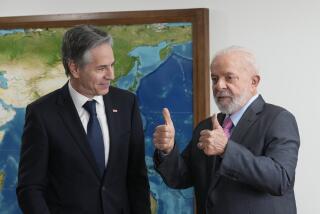Latin Nations Agree to Jointly Study Options for Easing Debt Load
- Share via
PUNTA DEL ESTE, Uruguay — Finance Minister Mailson Nobrega of Brazil said Friday that Latin America’s major debtor countries have agreed to jointly examine an array of options for reducing their crushing foreign debt burden.
Nobrega told reporters that the finance ministers of seven countries will meet in early December in Rio de Janeiro to consider proposals to reduce the Latin debt, which exceeds $420 billion.
If the seven countries reach agreement, it would be the first concerted program by Latin America to ease a debt burden that every country in the region agrees has crippled development, caused widespread economic hardship and encouraged social unrest.
Nobrega said the group intends to avoid confrontation with the region’s creditors and does not plan to form a debtors’ cartel. He said the presidents of the seven countries, meeting for three days in this Atlantic resort, had decided to pool their financial expertise in examining ways to allow each debtor nation to negotiate separately a reduction in its debt burden.
He emphasized that the goal is to reduce the overall “debt stock”--principal and interest--rather than merely delay repayment.
Nearly all Western governments and banks have refused so far to consider any actual write-off of debt owed by developing countries, choosing instead to reschedule debts and make new loans to enable the debtor countries to continue making payments.
Nobrega refused to speculate on what measures the finance ministers might recommend. He noted that the French and Japanese governments had put forward plans for consideration by debtors and creditors.
He said technical meetings will begin within two weeks to prepare for the December gathering.
Nobrega talked with reporters during a break in the second day of meetings here of the presidents of Argentina, Brazil, Colombia, Mexico, Peru, Uruguay and Venezuela.
The summit of the so-called Group of Eight, which is focusing on debt, regional economic integration and the drug problem, will conclude today.
More to Read
Sign up for Essential California
The most important California stories and recommendations in your inbox every morning.
You may occasionally receive promotional content from the Los Angeles Times.












